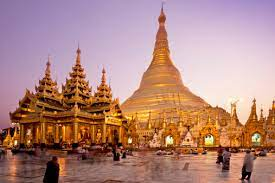CURRENT AFFAIRS
Get the most updated and recent current affair content on Padhaikaro.com
Myanmar- Past and Present
- IAS NEXT, Lucknow
- 05, Feb 2022

Reference News:-
There have been mass protests, armed resistance and mass killings in Myanmar since the military seized control a year ago.
- Elected leader Aung San Suu Kyi has been jailed after what her supporters say are show trials.
- The Myanmar military grabbed power in a coup last year– the third time in the nation’s history since its independence from British rule in 1948.
Who is in charge now?
Military commander-in-chief Min Aung Hlaing has taken power. He has long wielded significant political influence, successfully maintaining the power of the Tatmadaw – Myanmar’s military – even as the country moved towards democracy.
What has the international reaction been to the coup?
- The United Nations has warned of a deepening humanitarian crisis in Myanmar, with “an intensification of violence and a rapid rise in poverty”.
- US Secretary of State Antony Blinken has accused the security forces of a “reign of terror”.
- The US, UK and European Union have imposed sanctions on military officials.
- China blocked a UN Security Council statement condemning the coup, but has backed calls for a return to democratic norms.
India’s demands:
- Myanmar’s return to democracy at the earliest.
- Release of detainees and prisoners.
- Resolution of issues through dialogue.
- Complete cessation of all violence.
India is supporting ASEAN initiative on Myanmar and the ‘Five-Point Consensus’: It includes:
- Immediate cessation of violence.
- Dialogue among all stakeholders in Myanmar for a peaceful solution.
- The appointment of a special Asean envoy to facilitate mediation.
- Aid to Myanmar.
- A visit to the country by the envoy.
A brief History of Myanmar:
When British imperialists annexed what is today’s Myanmar during the 19th century, they called it Burma after the dominant Burman (Bamar) ethnic group, and administered it as a province of colonial India.
- This arrangement continued until 1937, when Burma was separated from British India and made a separate colony.
- Even after the country became independent in 1948, it retained the same name, becoming the ‘Union of Burma’.
- In 1962, the military took over from a civilian government for the first time, and amended the official name in 1974 to the ‘Socialist Republic of the Union of Burma’.
- Then in 1988, Myanmar’s armed forces again took power in the country, after suppressing a popular uprising that led to the deaths of thousands, and reversed the official name to ‘Union of Burma’.
- But a year later, the junta adopted a law that replaced Burma with Myanmar, making the country the ‘Union of Myanmar’.
Why the name change was controversial?
While changing the country’s name, the military said that it was looking for a way to leave behind a name inherited from the colonial past, and adopt a new one which could unify all of its 135 officially recognised ethnic groups, and not just the Burman people.
- Critics decried the move, arguing that Myanmar and Burma mean the same thing in the Burmese language, only that the ‘Myanmar’ is a more formal way of saying ‘Burma’– a word used colloquially.
- The other name changes too, such as Rangoon to Yangon, only reflected greater conformity with the Burmese language, and nothing else.
- Also, the name changes took place only in English. Even in English, the adjective form remained (and continues to remain) Burmese, and not Myanmarese.
- Pro-democracy sympathisers said that the name changes were illegitimate, as they were not decided by the will of the people.
- As a result, many governments around the world opposed to the junta decided to ignore the name changes, and continued to call the country Burma and its capital Rangoon.
Myanmar’s military Constitution:
It was the military that drafted the 2008 Constitution, and put it to a questionable referendum in April that year.
- The Constitution was the military’s “roadmap to democracy”, which it had been forced to adopt under increasing pressure from the west.
- It was also due to its own realisation that opening up Myanmar to the outside world was now no longer an option but a dire economic necessity.
- But the military made sure to safeguard in the Constitution its own role and supremacy in national affairs.
- Under its provisions, the military reserves for itself 25 per cent of seats in both Houses of Parliament, to which it appoints serving military officials.
- Also, a political party which is a proxy for the military contests elections.